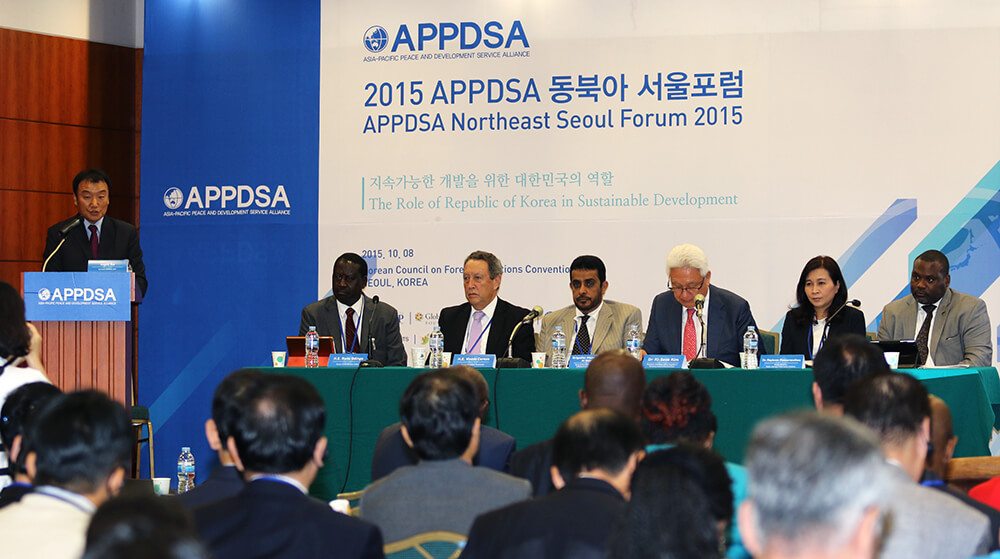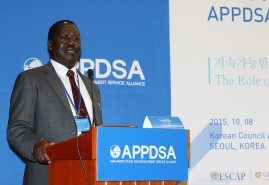Asia-Pacific Peace and Development Service Alliance Convening Highlights Service, Volunteerism, Youth Engagement
The growth of Korea from one of the poorest countries in the world into a modern, vibrant democracy and one of the world’s leading economies presents important lessons to developing nations said economists, political leaders and development experts at a forum, “The Role of Korea in Sustainable Development,” on October 8, 2015.

Development experts discuss South Korea’s role in sustainable development in Seoul, South Korea.
The experience of this transition, the challenges, the national resolve and government/private sector collaboration, are invaluable assets that can offer hope to the global community in achieving the United Nations Sustainable Development Goals, speakers emphasized.
The forum was co-convened by the United Nations Economic and Social Commission for Asia and the Pacific, UN-HABITAT, Korean Council on Foreign Relations, and the Global Peace Foundation as part of a series of academic forums and public events to support the advance of peaceful unification of the Korean peninsula of the seventieth anniversary of the division of Korea. Additional sponsors of the forum included Love in Lights, Asia Development Relief Foundation, Service for Peace, Scientists and Engineers without Borders, Educators without Borders, Korean Society For U-City, and the Utokapat Foundation.
Korea’s humanitarian advances worldwide
The forum highlighted the Republic of Korea’s growing humanitarian and service work worldwide, and examined ways to strengthen the contributions of youth and volunteerism, improve coordination among sectors, build partnerships, and mobilize resources in Korea to advance a development agenda.
“Development of youth is a prerequisite for nation building,” said Tae-Ik Chung, Chairman of the Korean Council on Foreign Relations, in welcoming remarks. “The spirit, diligence, enthusiasm and the creativeness of the youths contribute positively for all-round development of a nation.”
Former Kenyan Prime Minister Raila Odinga praised Korea for its vigorous efforts to build political and economic structures to lift the nation out of poverty. “Your investment in meritocracy, democracy, education, invention and innovation has paid dividends and continues to provide useful lessons for the rest of the developing world,” the Prime Minister said. “Korea has shown the world that economic growth can also be equitable and inclusive.”
Mr. Odinga said that Korea, Kenya and Africa could be reliable partners in global diplomacy and economic development. He said that Korea can provide the economic support, skills and manpower needed for modernization and growth in Africa. “Above all, Korea remains an inspiration and a motivation that indeed, with the right policies, nations can rise.”
The Prime Minister also used the forum to encourage international partnerships as one means of facilitating the unification of the two Koreas. Greater cooperation and stability he suggested will promote more investment in the South, uplift the North, and “foster a more future-oriented and multi-faceted partnership in the Asia-Pacific region and beyond.” Mr. Odinga continued, “Personally, I stand ready to visit Pyongyang if it can help bridge the divide and help with confidence-building measures.”
Ki-Seok Kim, President of Educators without Borders and Honorary Consul of Burkina Faso, presented a case study of Korean-Burkina Faso collaboration from 2007-2015 through a joint project, Global Alliance for Poverty Alleviation. The comprehensive project included adult literacy, agricultural training and environmental preservation, husbandry, entrepreneurship, malaria and HIV/AIDS prevention, and microfinancing. Winner of the 2014 UNESCO Award in September, the project has received invitations from countries including Senegal, Kenya, and Ethiopia.
Priority of education
Africa and Asia Development Relief Foundation President Yi-Jong Kwon summarized the many priorities addressed in the UN Sustainable Development Goals, but particularly stressed the importance of education as a response to poverty. He movingly talked about his experience and aspirations as one of 20,000 Koreans sent to Germany as laborers at the end of the Korean War.

Africa and Asia Development Relief Foundation President Yi-Jong Kwon speaks at the APPDSA forum.
“The priority for everyone at that moment was only one, survival,” he reflected. “In spite of enduring hunger and working at a blind end in a mine gallery, I never gave up on study. I was convinced that learning and studying was the only way for me to get out of this horrible poverty.”
He said behind the Korea’s development are much time and effort invested into children’s education in order to overcome poverty. “For the better future, the international society should provide neglected children with the opportunity for equal education,” he said.
Global Peace Foundation Vice President of Strategic Partnerships David Caprara reminded the forum of the recent establishment of the Asia Pacific Service Alliance in Bangkok and immediate impact the alliance had following the devastating earthquake in Nepal through the youth volunteer movement Rise Nepal.
“As Pope Francis stated well,” Caprara said, “the critical elements involved in saving our planet—from addressing climate change, to working to eradicate poverty and bring peace—are inextricably linked, and we must each exert all of our effort in concrete steps after today’s meeting to achieve these noble goals.
“How can we learn today from the unique experience of the Korean people who rose from the ashes and tragic division of the Korean war 70 years ago, and whose country was transformed from a nation of abject poverty to a modern donor nation? The answer is rooted in the Korean people’s commitment to their universal, founding principles of hongik ingam: ‘Living for the benefit of all mankind.’
“While we are here today to study and learn from the unique Korean model of development, we are also here to further build this movement of multi-stakeholders – led by youth, powered by the private sector, and infused with faith in the universal principles of unity and service.”
Original article: www.globalpeace.org


